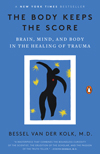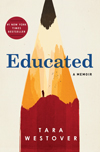Odds are that each of us knows someone living with a mental illness, or live with one ourselves. But unfortunately, because of stigma, lack of resources, or awareness, we often go through these struggles alone, sometimes never receiving critical support, or even knowing that what we are experiencing can be helped.
While the severity varies greatly from person to person, mental illness affects one in five people, including the teenagers that come to Camp each summer. Researchers estimate that as many as 50 percent of youth ages 13-18 will deal with some sort of mental health issue, and half of all serious mental illnesses set in by age 14.
This May marks the 70th anniversary of Mental Health Month, an initiative started to reduce stigma and raise awareness of mental health issues. So we’re focusing on books and articles that include courageous personal stories that put us in the shoes of people dealing with mental illness and trauma, as well as decades of research to help us better understand the pathways to healing. The more we know about mental health and what it feels like to be depressed or anxious, to carry trauma, or have a chemical makeup that prohibits you from thriving, the more empathetic, supportive, and successful we’ll be when it comes to helping others, and ourselves.
 The Body Keeps the Score: Brain, Mind, and Body in the Healing of Trauma, Bessel van der Kolk
The Body Keeps the Score: Brain, Mind, and Body in the Healing of Trauma, Bessel van der Kolk
What does trauma do to our mind? What does trauma do to our brain (i.e. the physical organ that contains the mind)? What does trauma do to our bodies, and how do we heal? Based on work experience, lived experiences, and decades of studies, Dr. van der Kolk, a leading expert of trauma who has worked with clients ranging from veterans to sexual assault victims, explores how trauma imprints on our bodies, and how we can better understand and treat its detrimental effects. This book will be immediately useful and interesting to anyone who has experienced trauma, knows people who have experienced trauma, or works with people who have experienced trauma (hint: that means all of us). — Greg Barker, Manager of Facilitation Programs
 Educated, by Tara Westover
Educated, by Tara Westover
This harrowing memoir gives readers a strikingly intimate and firsthand look into the toll that mental illness can take on individuals and families. Raised in rural Idaho by an ultra-religious, survivalist family, Westover describes in detail years of neglect and abuse at the hands of a mentally ill father and sibling. Despite having never stepped in a classroom until she was 17, she eventually finds freedom through education. From Brigham Young University—where she hears about the Holocaust for the first time—to the elite halls of Harvard and Cambridge, she struggles to reckon with the world she was told about, and the one she’s discovering for herself. Westover’s story is a uniquely moving, complicated, and eye-opening that is at times uncomfortable to read, but utterly impossible to forget. — Dindy Weinstein, Director of Individual Philanthropy
 Bee Season, by Myla Goldberg
Bee Season, by Myla Goldberg
Myla Goldberg tells the story of a family of four growing distant from one another as they fight to find themselves and find connection with each other. The 9-year-old daughter, Eliza, strives to be seen as intelligent and accomplished as the rest of her family. Her brother Aaron rejects the family’s traditions in search of a higher spiritual understanding and sense of belonging. And while their father pressures them to fulfill his own dreams, their mother is struggling with a hidden life unknown to the family. Goldberg lyrically depicts the pain and pressure felt by each family member, exploring their deep inner selves and taking the reader along through layers of mental states and identity. Heart wrenching and beautifully written, Bee Season reveals how disparate our inner lives can be from our outward appearance, and the importance of human connection to care for and support each other. —Emily Umansky, Development Association
 We’ve Got Issues, by Judith Warner
We’ve Got Issues, by Judith Warner
Journalist Judith Warner set out to write a book exploring the overmedication of American children. What she discovered in the course of her research, by spending time with families whose kids are dealing with a variety of mental and behavioral health issues and hearing their stories, is that, in fact, far too many children were not receiving the treatment they and their families so desperately needed. What they received instead was stigmatization and recrimination. Through listening to others’ stories and experiences, the author’s preconceived narrative was challenged, which fits very much in line with the work of Seeds of Peace! This book supported me at a time in my parenting journey when I needed empathy and understanding, not judgment. — Deb Levy, Director of Communications
Also don’t miss
The Anxiety Chronicles, The Lily (The Washington Post)
Women are nearly twice as likely as men to develop an anxiety disorder, a serious medical condition that, as 15-year-old Ella Gross wrote recently, “is so much more than just being scared of public speaking.” For nearly a year this series has put a spotlight each week on a different woman’s journey with anxiety. They vary from teenagers to grandmothers and experience a wide range of symptoms and effects, though a common thread is that many began experiencing symptoms years—sometimes decades—before receiving help. By sharing their stories, these women are helping shine a light on one of the most commonly ignored, and commonly experienced, forms of mental health disorders in the United States.
Primal Fear: Can Monkeys Help Unlock the Secrets of Trauma? Luke Dittrich, New York Times Magazine
In the weeks after Hurricane Maria devastated Puerto Rico in 2017, a researcher began noticing unexpected patterns among one of its island’s monkeys: One, the monkeys seemed to be expanding their social networks, increasing the number of individuals that they had meaningful relationships with. Two, the monkeys appeared to become more tolerant of one another, despite living with radically diminished resources. “It was as if the hurricane had bonded even former foes against a common enemy and made the monkeys much more tolerant of life’s everyday frustrations, at least in the early days,” Dittrich wrote. Sound familiar? This fascinating article explores how researchers are seeing a rare opportunity in our genetic cousins to gain answers to long unanswered questions about the psychological effects that a disaster like Hurricane Maria has on humans.
Have any suggestions we should check out? Add them in the comments! And if you or someone you know needs information about mental health services, visit mentalhealth.gov or the World Health Organization.
Banner photo credit: Ella Gross/Lily/Washington Post

